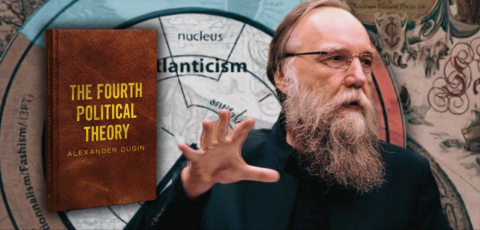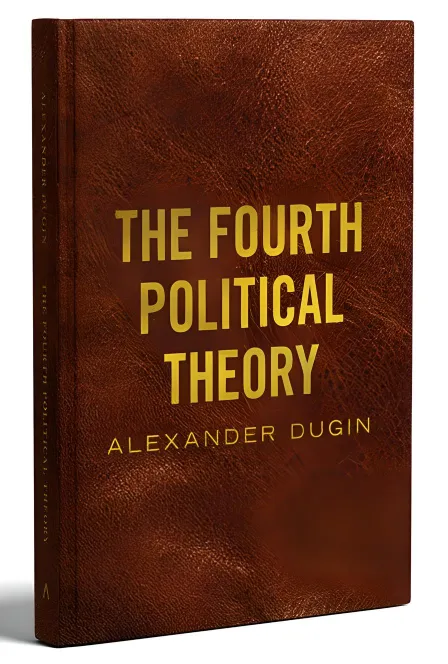Towards the Fourth Political Theory
Primary tabs

At this point, we should raise a very important question: what kind of ideology should we use in our opposition to globalisation and its liberal democratic, capitalist, and modernist (postmodernist) principles? I believe that all previous anti-liberal ideologies (communism, socialism, and fascism) are no longer relevant. They tried to fight liberal capitalism and they failed. This is partly because, at the end of time, it is evil that prevails, and partly because of their inner contradictions and limitations.
So it is time to begin a deep revision of the illiberal ideologies of the past.
What are their positive sides? Their positive side is the very fact that they were anti-capitalist and anti-liberal, as well as anti-cosmopolitan and anti-individualist. These features should be accepted and integrated into a future ideology. But communist doctrine itself is modern, atheist, materialist and cosmopolitan. That should be thrown out. On the other hand, communism’s social solidarity, social justice, socialism and general holistic attitude to society are good, in and of themselves. So we need to separate out the materialist and modernist aspects of communism and reject them, while preserving and embracing its social and holistic aspects.
As for the theories of the Third Way — which were dear, up to a certain point, to some traditionalists such as Julius Evola — there were many unacceptable elements, foremost among these being racism, xenophobia and chauvinism. These are not only moral failures, but also theoretically and anthropologically inconsistent attitudes. Differences between ethnicities do not equate to superiority or inferiority. The differences should be accepted and affirmed without any racist sentiments or consideration.
There is no common or universal measure to judge different ethnic groups. When one society tries to judge another, it applies its own criteria, and so commits intellectual violence. This ethnocentric attitude is precisely the crime of globalisation and Westernisation, as well as of American imperialism.
If we free socialism from its materialist, atheistic and modernist features, and if we reject the racist and narrow nationalist aspects of the Third Way doctrines, we arrive at a completely new kind of political ideology.
We call it the Fourth Political Theory, or 4PT, the first being liberalism, that we essentially challenge; the second being the classical form of communism; and the third being National Socialism and fascism. Its elaboration starts from the point of intersection between different antiliberal political theories of the past (namely communism and the Third Way theories). So we arrive at National Bolshevism, which represents socialism without materialism, atheism, progressivism, and modernism, as well as the modified Third Way theories.
But that is only the first step. The mechanical addition of deeply revised versions of the anti-liberal ideologies of the past will not give us a final result. It is only a first approximation and preliminary approach.
So we need to unite the Right, the Left and the world’s traditional religions in a common struggle against the common enemy. Social justice, national sovereignty and traditional values are the three main principles of the Fourth Political Theory. It is not easy to put together such a varied alliance. But we must try if we want to overcome the foe.
We must go further and make an appeal to Tradition and to pre-modern sources of inspiration. There we have the Platonic ideal state, medieval hierarchical society, and theological visions of the normative social and political system (Christian, Islamic, Buddhist, Jewish or Hindu). These pre-modern sources are a very important development for the National Bolshevism synthesis. Therefore, we need to find a new name for this kind of ideology, and Fourth Political Theory is quite appropriate. It does not tell us what this theory is, but rather what it is not. So it is a kind of invitation and appeal, rather than dogma.
Politically, we have here an interesting basis for the conscious cooperation of the radical Left-wingers and the New Right, as well as with religious and other anti-modern movements, such as the ecologists and Green theorists, for example. The only thing that we insist on in creating such a pact of cooperation is to put aside anti-communist, as well as anti-fascist, prejudices. These prejudices are the instruments in the hands of liberals and globalists with which they keep their enemies divided. So we should strongly reject anti-communism as well as anti-fascism. Both of them are counter-revolutionary tools in the hands of the global liberal elite. At the same time, we should strongly oppose any kind of confrontation between the various religious beliefs — Muslims against Christians, Jews against Muslims, Muslims against Hindus and so on. The inter-confessional wars and tensions work for the cause of the kingdom of the Antichrist who tries to divide all the traditional religions in order to impose his own pseudo-religion, the eschatological parody.
So we need to unite the Right, the Left and the world’s traditional religions in a common struggle against the common enemy. Social justice, national sovereignty and traditional values are the three main principles of the Fourth Political Theory. It is not easy to put together such a varied alliance. But we must try if we want to overcome the foe.
In France, there is a saying coined by Alain Soral: la droite des valeurs et la gauche du travail. In italian it goes: La destra sociale e la sinistra identitaria. How exactly it should sound in English we will see later.
We could go further and try to define the subject, the actor of the Fourth Political Theory. In the case of communism, the central subject was class. In the case of the Third Way movements, the central subject was either the race or the nation. In the case of religions, it is the community of the faithful. How could the Fourth Political Theory deal with this diversity and the divergence of subjects? We propose, as a suggestion, that the main subject of the Fourth Political Theory can be found in the Heideggerian concept of Dasein. It is a concrete, but extremely profound instance that could be the common denominator for the further ontological development of the Fourth Political Theory. What is crucial for consideration is the authenticity or non-authenticity of the existence of Dasein. The Fourth Political Theory insists on the authenticity of existence.
So it is the antithesis to any kind of alienation — social, economic, national, religious or metaphysical.
But Dasein is a concrete instance. Every individual and every culture possesses their own Dasein. They differ between each other, but they are always present.
Accepting Dasein as the subject of the Fourth Political Theory, we should progress toward the elaboration of a common strategy in the process of the creation of a future that fits our demands and our visions.
Such values as social justice, national sovereignty and traditional spirituality can serve us as the foundation.
I sincerely believe that the Fourth Political Theory, and its secondary variations, National Bolshevism and Eurasianism, can be of great use for our peoples, our countries, and our civilisations. The key manager of differences is multipolarity in all senses — geopolitical, cultural, axiological, economic, and so on.
The important concept of nous (intellect), developed by the Greek philosopher Plotinus1, corresponds to our ideal. The intellect is one and multiple at the same time, because it has multiple differences in itself — it is not uniform or an amalgam, but taken as such with many parts, and with all their distinct particularities. The future world should be noetic in some way — characterised by multiplicity; diversity should be taken as its richness and its treasure, and not as a reason for inevitable conflict: many civilisations, many poles, many centres, many sets of values on one planet and in one humanity. Many worlds.
But there are some who think otherwise. Who are aligned against such a project? Those who want to impose uniformity, the one (American) way of life, One World. And their methods are force, temptation, and persuasion.
They are against multipolarity. So they are against us.
The Fourth Political Theory is Alexander Dugin’s most seminal work. Pre-order the limited leather-bound edition now — only 100 copies available — before it’s too late, right here at the Arktos Shop.

1. Plotinus (ca. 204-270) was a Greek philosopher who was the founder of the mystical school of thought now known as Neoplatonism. — Ed.
